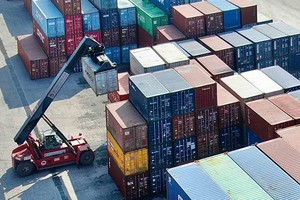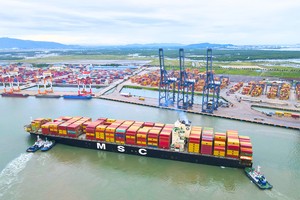
Real performance on the digital floor
Cross-border e-commerce is rapidly establishing itself as a stable and effective export channel, according to Marketing Director Nguyen Thi Phuong Uyen of Alibaba.com Vietnam. This trend is evidenced by the growing visibility of Vietnamese products on major global marketplaces.
Over the past five years, the volume of Vietnamese products sold on Amazon has climbed by over 300 percent, reaching nearly 18 million items. Furthermore, recent reports indicate that some companies have secured multi-million dollar contracts just months after joining these platforms.
Data from Alibaba.com for the second quarter of 2025 underscores this rising global demand for Vietnamese manufacturing:
| Sector |
Increase in 'Made in Vietnam' Searches (Q2-2025) |
| Footwear |
172 percent |
| Packaging and Printing |
94 percent |
| Agricultural Products |
84 percent |
| Food and Beverages |
71 percent |
| Beauty Products |
Nearly 68 percent |
This surge in search volume indicates that numerous developed nations are increasing their procurement orders from Vietnam. The Ministry of Industry and Trade confirms that prominent Vietnamese brands such as King Coffee, AnEco, Sunhouse, and Lafooco have successfully established their presence and reputation on international digital storefronts.
The documented successes affirm that Vietnamese products are steadily establishing a strong competitive position in the global digital arena, with several domestic enterprises leveraging cross-border e-commerce to secure lucrative international contracts.
A notable example is Sukavina Company which achieved over US$200,000 in export revenue within just seven months of joining Alibaba.com. By May 2025, the company secured two subsequent contracts valued at $2.5 million with partners in Japan and India.
A representative from Sukavina Company revealed: "Previously, we were almost entirely reliant on domestic clients. By utilizing the B2B platform, we have learned to optimize our storefront, ensure rapid response times, and maintain credibility with every order. The transparency fosters greater trust with our partners."
Similarly, V.KAUS Company transitioned from a purely trading model to investing in a dehydrated processing factory after three years on the platform. This investment was necessary to meet substantial order volumes from markets including Europe, the US, Canada, and Japan. Since the beginning of 2025, the company’s export revenue has stabilized at over $500,000 per month.
A company representative highlighted that e-commerce provided access to the demanding European market. They noted the current efficiency that with just a few steps on a phone or computer, the company can present products, send samples, and sign contracts online.
In the consumer goods sector, Saigon Cosmetics Joint Stock Company (SCC) demonstrated that e-commerce significantly shortens the time required to penetrate stringent markets. After investing in official storefronts on Amazon and Shopee Global, SCC's online export revenue increased by over 30 percent annually, with international orders now contributing approximately one-fifth of total revenue.
According to Marketing Director Vuong Ngoc Dung, the decisive factors for this success involve standardizing packaging, adhering to international benchmarks, and adapting the brand story for the digital language. This approach allows a single digital campaign to simultaneously open doors to multiple foreign markets - a process that previously required six to twelve months of work through traditional intermediaries.
Policy serves as midwife
According to data from the Ministry of Industry and Trade, Vietnam’s e-commerce market has surpassed $25 billion—an increase of 20 percent compared to the same period last year. The sector now accounts for approximately 10 percent of total retail sales of goods and consumer services, ranking Vietnam third in Southeast Asia.
Projections indicate that by 2030, this figure could reach US$63 billion, presenting significant opportunities for Vietnamese products to expand their market share and reach global consumers.
To effectively capitalize on this growing trade channel, Chairman Nguyen Dinh Tung of Vina T&T Group and Vice Chairman of the Vietnam Fruit and Vegetable Association emphasized the importance of brand legitimacy as a key factor in enhancing the value of Vietnamese products. He noted that fragmented production and inconsistent standards make it difficult for Vietnamese goods to stand out internationally, often limiting them to the role of processors. Conversely, when products are supported by strong, transparent branding and traceability, they can command higher prices and gain entry into demanding markets such as the United States and Europe.
Echoing this perspective, Deputy General Secretary of the Vietnam E-commerce Association Nguyen Minh Duc highlighted the need for enterprises to strengthen their digital management capabilities. He urged businesses to invest in young professionals who not only understand the products but can also operate international e-commerce platforms effectively. Additionally, he recommended applying artificial intelligence (AI) to automate operations, reduce costs, and broaden market access.
Based on this reality, the Ministry of Industry and Trade has identified e-commerce as a strategic pillar in the overall development plan for the 2026-2030 period, aiming to build a sustainable digital export ecosystem, helping Vietnamese enterprises improve their international competitiveness and reduce intermediary costs. According to Deputy Director of the Department of E-commerce and Digital Economy Lai Viet Anh, the ministry is focusing on three major groups of solutions such as perfecting institutions and legal infrastructure, deploying national digital platforms, and supporting businesses by industry. This is a necessary legal corridor for transactions, logistics, payments and consumer protection in the digital environment.
At the same time, the ministry organizes training and consulting programs tailored for each group of enterprises, ensuring that even small-scale units can still participate. The Ministry is also operating the national digital trade promotion ecosystem with the iTrace247 (traceability), Vietrade CRM, Vietrade Map, Vietrade Edu and Smart B2B platforms. In particular, the Ministry is accelerating the integration of iTrace247 with the Customs and electronic C/O systems, helping businesses reduce procedures, save costs and make export records transparent.
























